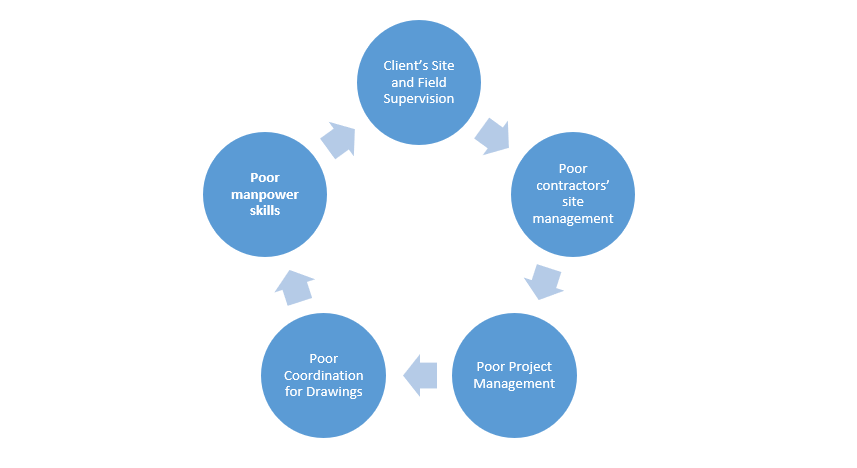Blog
Do you know the Top 5 Reasons for Constructions Projects Delay in Kuwait?
– Saad Mousa
Introduction
Construction projects are notorious for over running time and cost and a plethora of international research has been conducted to define causes of delay in completing projects. Recently a research was conducted by Kuwait University as a part of a study targeting client representatives, contractors and architectural/engineering (A/E) firms exploring the cases of delays in construction projects in Kuwait. The paper was authored by Hashem M. Al-Tabtabai, Civil Engineering Department, Kuwait University and was the result of a comprehensive questionnaire given to various stakeholders in the constructions industry.
The construction industry is a major stimulant in Kuwait’s economic growth as the government takes a major share in the construction activity. During the last decade, many of the building and residential projects have not finished on time. According to the NHA records, it is estimated that a family has to wait for a period of 14 years to receive a particular housing unit. Thus, there is a need for the construction industry to find ways to be more efficient.
Based on the study here are the top 5 reasons which resulted in delays on construction projects
The Top 5 reasons

1. Client Site and Field Supervision
The study concludes that this is the top reason for delay factors associated with the construction projects. The contractor ranked limited authority given to the client’s supervisory staff to approve minor change orders and approve new construction alternatives as the most significant delay factor. They also ranked client’s slow processing of the contractor’s payment certificates to be the top cause of construction delays. Moreover, both the contractors and designers firms think that the view of favoritism toward the contractor proposals is making the client’s supervision staff afraid of taking decisions and prefers to have top client’s top administration staff make the needed decisions and approvals.
The decision making process is extremely time consuming and the flow of information between project level and client’s administration level is inefficient. To avoid this, a simple collaboration and communication tool could be setup.
We have seen many clients resolve this issue by using a project management system (PMIS) like AutoPRO®, the client could setup efficient and practical procedures for immediate approvals of documents or changes which would facilitate quick coordination between the client site office and client head office.
2. Poor contractors site management
Poor contractors’ site management and planning was ranked the second top reason which included contractors’ late construction mobilization, misinterpretation of drawings and specification. This suggests the necessity for the application of professional construction management practices and processes that build the spirit of teamwork and professional trust among the construction contractual parties.
3. Poor Project Management
This clearly shows that there is a lack of the application of project management techniques in governmental projects. There is a shortage of construction managers in Kuwait and the industry as a whole lacks professionalism. It is evident that contractors’ organizations need to adopt human resources department and train their engineers in the principles and techniques of project management.
4. Poor coordination or drawings
Therefore, these firms are in desperate need for many skilled engineers and architect In addition, clients do not spend enough time with design firms during the design phase to ensure that their requirements are met.
One way to build a good work force would be to implement a Business Process Management system like AutoPRO® to manage the recruitment process for the design firms and related parties. The system would enable them to store a database of the various positions in the company and match the related applications and candidates to their jobs. This would enable quick search and filter of CVs for recruitment and best fit based on the remunerations.
5. Poor Manpower skills
Conclusions:
- The application of professional construction management (CM) practices that builds the spirit of teamwork and professional trust among the construction contractual parties is necessary. The owner should schedule his structure contracts for the project using the CM approach. The CM approach establishes the procedures for award of all contracts to designers, main vendors, and trade contractors. Once contractual relationships are established, the CM not only controls the prime contractor but also all subcontractors as well as major vendors and off-site fabricators.
- Both clients’ site personnel and local contractors should adopt CPM and advanced technology in the management and control of projects. Moreover the clients should enforce the use of these tools.
- Efforts should be exerted towards automation of project’s communication and documentation flow.
- As opposed to liquidated damages, a scheme to provide financial incentives for contractors who finish projects on time should be implemented by incorporating incentive or bonus clauses in the contract. Bonuses may be pre¬scribed for progress determinants as well as for quality determinants. Such clauses are excellent means of rewarding constructors for finishing early and for high quality work.
A similar paper was released after study was conducted for the entire GCC region. The paper was authored by Hassan Emam, Peter Farrell and Mohamed A. Abdelaal. The country selection was limited to GCC countries (Bahrain, Kuwait, Oman, Qatar, Saudi Arabia, and UAE). The results showed some common patterns and reasons for the delay of projects in other countries too. Click here download the e-paper


